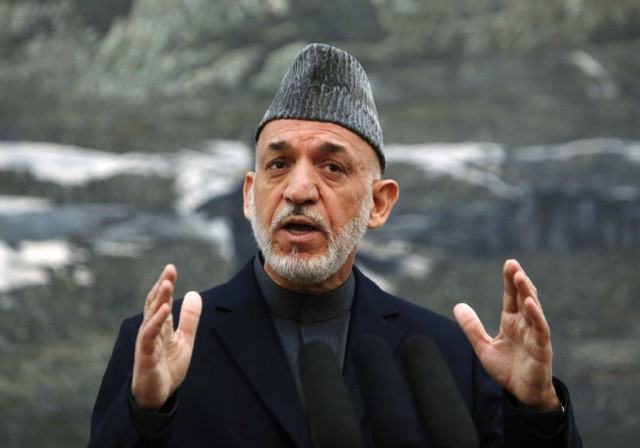Neighbourhood watch: Karzai’s plan to convene grand assembly sparks controversy
Opposition claims the president is trying to influence elections through the jirga.

Afghan President Hamid Karzai cannot stand for a third time under the Afghan constitution . PHOTO: REUTERS/FILE
Afghan President Hamid Karzai plans to convene a consultative ‘loya jirga’ or grand assembly to discuss whether or not Afghanistan should sign a security pact with the United States ahead of the 2014 withdrawal of Nato troops.
However, the proposal has met with a great deal of criticism and suspicion as political rivals, members of parliament, the civil society and independent media have shown serious concern. Their doubts are strengthened by claims stating the government is trying to introduce amendments in the constitution to prolong Karzai’s rule.
Karzai cannot stand for a third time under the Afghan constitution and opposition parties allege the beleaguered president wants to use the jirga either to overstay his constitutional tenure or delay the elections. Opposition lawmakers have decided to announce a complete boycott if the government convenes the jirga.
The Afghan National Assembly, or lower house of parliament, also stated convening the jirga was against the interests of the people and warned it would be an unconstitutional act. The Afghan media quoted National Assembly Deputy Speaker Mirwais Yasini saying convening the loya jirga meant undermining the legitimacy of the lower house.
A front of Karzai’s political opponents met in Kabul this week and expressed concern about the president’s future plans. The front’s leaders went as far as to suggest the government would influence jirga participants to “take illegal decisions regarding the coming presidential election.”
Chief of the National Front, Ahmad Zia Masud, while speaking at the meeting, said the opposition would not participate in any proceedings if the Afghan government called the loya jirga.
“Karzai is making an effort to stay in power, or he wants to help a candidate of his own choosing,” said Masud. “He has delayed dialogues with the US regarding the security pact for this purpose. He wants to pressure the superpower into supporting his favoured candidate.”
Presidential spokesperson Aimal Faizi, however, has rejected the criticism levied against the jirga and claimed its only aim is to discuss the security pact. Faizi maintained the jirga would be constituted to understand the views of, and gain support from, a large number of the people’s representatives.
However, in light of the deep mistrust, Faizi’s clarification did nothing to convince the Afghan president’s political opponents, especially since the spokesperson alleged some circles were impeding the jirga’s objectives so that Afghanistan would blindly sign the security pact.
The controversy has surfaced in the war-torn country with less than a year remaining for the presidential elections, not to mention the 2014 end game.
Karzai suspended talks with the US a day after the Taliban opened their political office in Qatar last month. He accused Washington of “inconsistent statements and actions” with regards to the peace process.
On one hand, Karzai and his advisers are under fire for their political decisions. On the other, they have unleashed a barrage of negative comments against the US and Pakistan, whose support is considered imperative to the Afghan reconciliation goal.
In the latest verbal attack, Karzai’s Chief of Staff, Karim Khoram, accused the US and Pakistan of “dividing Afghanistan by giving a share to the Taliban”.
The US reacted angrily to Khoram’s remarks and US Ambassador James B Cunningham termed the allegation “nonsense”. “We have not spent blood and resources, alongside our Afghan comrades, in pursuit of any other purpose than a stable Afghanistan,” the ambassador said in a statement.
Just hours before Khoram’s wild allegations, Karzai’s security adviser, Rangin Dadfar Spanta, accused Pakistan of being involved in the murder of his brother, who was shot dead on Wednesday. Even though the Taliban claimed responsibility through spokesperson Qari Muhammad Yousaf, the blame was placed on Islamabad as per the current fashion in Kabul.
Spanta also discredited the government-backed peace council when he said there was no peace process in Afghanistan. Consequently, members of the peace process condemned Spanta for his rhetoric in a sign of internal conflict.
Published in The Express Tribune, July 20th, 2013.













COMMENTS
Comments are moderated and generally will be posted if they are on-topic and not abusive.
For more information, please see our Comments FAQ